Operation BART
Part of a series on Anonymous. [View Related Entries]
Overview
Operation BART (#OpBART) is an Anonymous hacktivist campaign that was launched against San Francisco's Bay Area Rapid Transit (BART) websites following its disruption of cellphone services in select subway stations in August 2011. According to the group's press release, the BART authorities disabled cellphone signals on its stations on August 11th, 2011 after receiving reports about a planned protest over fatal shootings of passengers by transit security officers.
Background
On July 3rd, 2011, a 45-year-old homeless man Charles Hill was fatally shot by two BART officers at San Francisco's Civic Center station. According to official statements, Hill was intoxicated and confronted the officers with knives when they arrived on the scene, leading them to fire 3 rounds at the man in close proximity.
Already struggling to maintain amicable relations with the community after the fatal shooting of Oscar Grant III in 2009, BART officers' shooting of Charles Hill led to a massive demonstration and riot inside and around Civic Center station on July 11th. One month later on August 11th, BART requested mobile service providers to block coverage in its stations to prevent another protest scheduled that evening.
Notable Developments
- On August 11th, almost immediately following the service disruption, angry citizens began posting complaints with the hashtag #muBARTec, a reference to the telecom shutdown imposed by the former Egyptian president Hosani Mubarak back in January 2011.
Anonymous-affiliated Twitter accounts posted a series of tweets hashtagged #OpBART[1] which amounted to an open IRC discussion on August 12th. Prior to the service outage, @YourAnonNews tweeted several messages calling on its supporters to join the protest.
Join us for #OpBART https://t.co/44rLCAg
Debate over Cellphone Outage
- BART's network outage on August 11th not only provoked complaints from the commuters, but it also drew scrutiny from the news media as well as civil liberties and free-speech advocacy groups like and Electronic Frontiers Foundation (EFF)[6] and American Civil Liberties Union (ACLU)[7], who renounced the Bay Area transit authority as "the first known government agency in the United States to block cell service in order to disrupt a political protest."
When asked by CNN[8], a transit official tried to justify the agency's decision by saying:
"We made a gut-wrenching decision that was forced upon us by the protesters," he explained. "They [the activists] made us choose between people's ability to use their mobile phones (and) their constitutional right to get from point A to point B."
ACLU responded to the news by posting an action alert regarding the phone access closure in San Francisco, criticizing the outage as "anti-democratic and a violation of the right to free speech and assembly."
EFF also put forth its skepticism towards BART's action in a statement titled "BART Pulls a Mubarak in San Francisco," which raised the question of whether BART officials directly cut off access to mobile phone nodes or requested individual carriers to disable their services.
"One thing is clear, whether it's BART or the cell phone carriers that were responsible for the shut-off, cutting off cell phone service in response to a planned protest is a shameful attack on free speech."
Following the Civic Center demonstration on August 14th, technology news blog Ars Technica[9] also chimed in on the debate with an article titled "Scenes from an Anonymous protest: Did San Francisco's subway pull a Mubarak?" which provided a round-up summary of the ongoing public debate and Monday's protest.
Launch of Operation BART
However, due to the distributed hosting used by BART, the DDoS part of the operation failed. “You can’t DDoS a Cloud Hosted Network,” one participant in the operation explained.
- According to the group's announcements leading up to Sunday, Operation BART consisted of several tactics like spamming BART inbox system and fax machines with e-mail bombs containing the group's condemning message, overwhelming the server host through DDoS attacks and organizing an IRL protest at the Civic Center station in downtown San Francisco. The plan was announced through their affiliated Twitter channels as well as a video uploaded onto YouTube[3]:
To the people of San Francisco,
We invite you to join us Monday, August 15th, at 5pm, for a peaceful protest at Civic Center Station. We will show the world and BART that we will not stand for these types of actions. We encourage you to wear a red shirt, in remembrance of those who have been battered by the BART police. We also encourage you to bring cameras to record any further abuse by police, and to legitimize the protest. Remember to bring your mask, and remember that this is a peaceful protest. Anonymous does not support violent action and it is discouraged.
- On August 14th, Anonymous released personal data of at least 2,400 BART customers including their names, e-mails, passwords, phone numbers and addresses, calling it a direct response against BART's decision to block cellphone signals in the subway in a Pastebin[4] press release. In a statement released on Sunday, BART verified that 2,400 of its 55,000 users were affected by the attacks and no financial information was stored in the database[5].
- However, Anonymous failed to deliver their signature DDoS attacks as BART websites used a distributed hosting method known as cloud-hosting, which serves as a defense against DDoS attempts. The group instead managed to vandalize the BART's promotional microsite myBART.com[2] by adding their signature Guy Fawkes masks and pirate flags on the homepage.

Protest at Civic Center
Around 5 pm on August 15th, a group of nearly 60 demonstrators and TV news reporters gathered at Civic Center station for a peaceful protest. Some protesters in the crowd ore red-spotted t-shirts or covered their faces with blood red bandanas to identify themselves as members of the Anonymous, who were encouraged to wear red shirt in remembrance of the recent police brutality victims in San Francisco.
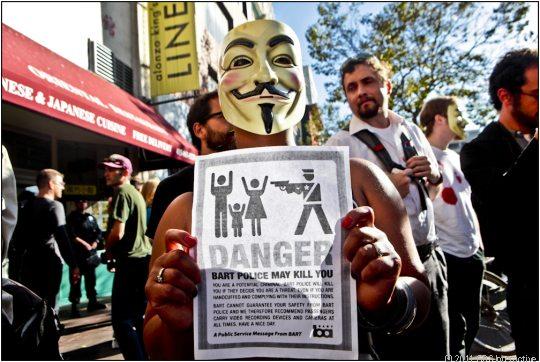

Despite concerns and rumors of yet another cellphone blockade, Monday's protest turned out to be a peaceful proceeding and San Francisco subway's wireless network remained operational.
Shortly after the demonstration on August 15th, Federal Communications Commission spokesman Neil Grace revealed that "the matter was under investigation" of federal communication regulators.
BART Hacked Again
On August 17th, hackers breached San Francisco's BART systems again, this time targeting the website of the BART Police Officers' Association and releasing a roster of 102 police officers and other agency employees with their home addresses, e-mails and passwords for the site. The roster was published on a separate website, where the hackers wrote, "Yet another success."
The identity of the perpetrators still remain unclear, as Anonymous-affiliated outlets are taking a cautious approach in addressing the latest attack. According to San Francisco Gate[10], Wednesday's follow-up hack may have created an internal conflict within the mysterious hacking collective, as some Anonymous participants supposedly have voiced their disagreement regarding the event.
The leak today of BART officer data could be the work sanctioned by those who truly support anonymous, or agent provocateurs. Stay skeptical
A hacker known as "Lamaline_5mg,” who claims to be a self-taught, female French computer programmer, has been attributed as the perpetrator in the news media. Meanwhile, BART Police Officers’ Association also released a statement vowing to hunt down the hackers in cooperation with FBI:
“These people are criminals, and we’re going to forward this information to the FBI,” presdient Jesse Sekhon told the paper. “These people need to be brought to justice. They can’t be terrorizing people.”
On August 20th, BART released an open letter explaining their reason behind shutting down the mobile network on August 11th. According to the statement, BART Police received tips about plans for color-coded teams to carry out acts of civil disobedience on numerous station platforms, with the red team on the frontline representing a "high possibility of arrest." One of the stunts planned for the August 11th demonstration sought to chain a group of protesters to the actual trains to delay the service.
August 22nd: OpBART-2 Protest Planned


Meanwhile, Anonymous and other BART protesters are planning yet another public demonstration during the rush hour commute on Monday, August 22nd, 2011. Over the weekend, several Anonymous-affiliated Twitter accounts and blogs encouraged their followers to join the protest at the Civic Center station. Hashtags like #OpBART and #MuBARTek have been on the rebound as well, though #OpBART is barred from trending due to its name conflict with the its eponymous Twitter handle @OpBART.
#OpBART-2 Today at 5pm, outside the civic center. Expect Us!!!
In response, the Bay Area Rapid Transit (BART) issued a warning to its passengers of possible service disruptions on Monday afternoon, citing the second protest planned b hacker group Anonymous. "BART may need to close some stations temporarily or make other service adjustments on short notice," according to the notice posted on BART's website.

On Twitter
External References
[1] Twitter – Search Results for #OpBART
[2] myBART – myBART Homepage
[3] YouTube – Anonyous: Operation BART
[4] Pastebin – Press Release – Anonymous Operation BART
[5] BART – Customer information about a mybart.org data breach
[6] ACLU North California – Cell Phone Censorship in San Francisco?
[7] EFF – BART Pulls a Mubarak in San Francisco
[8] CNN – BART reopens stations after protest threat fades
[9] Ars Technica – Did BART Pull a Mubarak in San Francisco?
[10] San Francisco Gate – Hackers post BART cops' personal information
Recent Videos 5 total
Recent Images 18 total
Share Pin
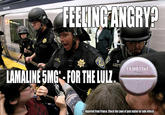
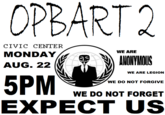
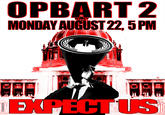
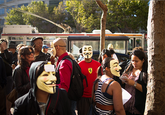
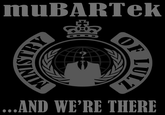
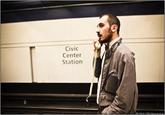







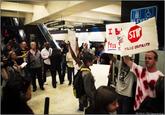
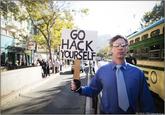
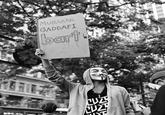
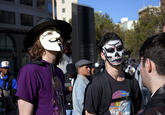
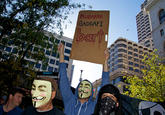
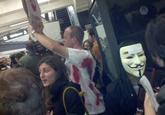

Top Comments
Nevar00
Aug 15, 2011 at 11:24AM EDT
Raybadurrsh
Aug 15, 2011 at 11:51AM EDT